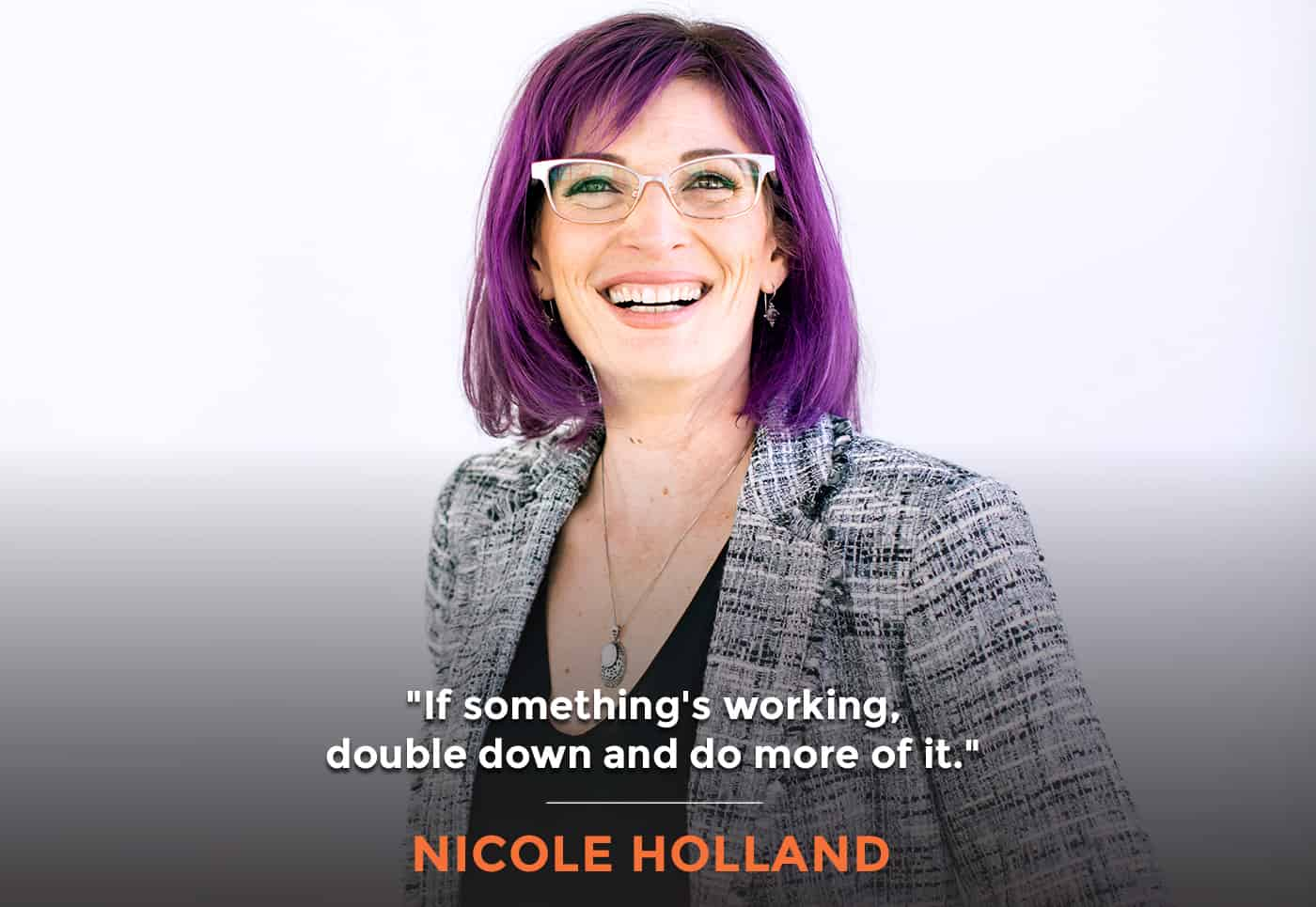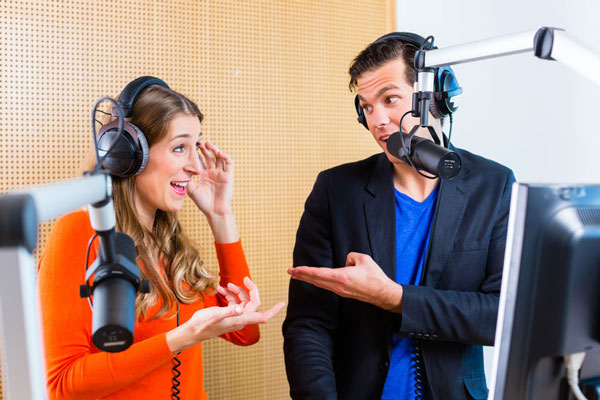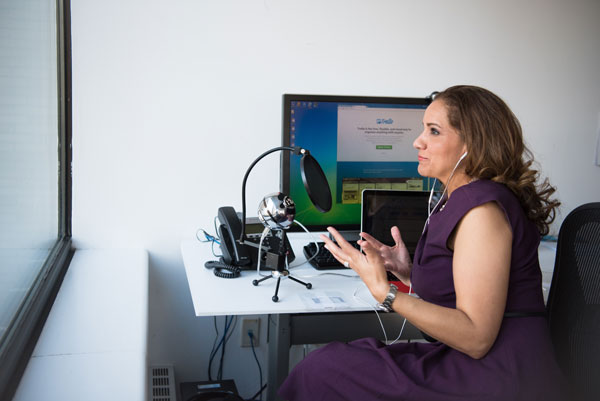Podcasting is huge right now. Yet, many podcasters struggle to make money or generate leads from their podcasts. Some even have trouble building an audience or producing consistent, engaging content. If you’ve confronted any of these problems or thinking about dipping your toe into the world of podcasting, then you’ll want to know what my guest for this episode has to say. Like me, Nicole Holland was an early adopter of podcasting. She has now moved on to using her expertise to help others leverage podcasts to build their brands, generate leads and develop relationships with highly influential people in their niche. If you’re wondering about the tricky techniques people use to make money from podcasting, how to refine your content or how to get more readers, this episode is going to provide you with some incredible tips and strategies as Nicole and I have tried them firsthand.

Transcript
Nicole, it’s great to have you on the show.
It is great to be here. Thank you for the invitation.
You’ve got a popular podcast and I’m curious as to how you ended up rebranding. I don’t know if starting over is the right word for it, but completely rebooting everything when you had such a huge following already. What was the impetus to do that and what was the impact?
This is going to be a vulnerable interview because I adore you. I’m going to let some of my ignorance come out here. The impetus and the reason that I transitioned to The Nicole Holland Show as opposed to the Business Building Rockstars Show goes back to my discomfort in being seen and having my name out there. I come from a law enforcement background. I was not looking to be recognized or seen or anything. I was very much a ghost when I started my online business. I pushed myself out of my comfort zone in order to get the job done. I had a brand that I built called the Business Building Rockstar brand. I had a summit for a few years. We had the show and absolutely it did quite well.
There came a point in time where I said, “I need to be front and center. I need to build my personal brand.” Everything that I do with the Business Building Rockstars is me doing me. People don’t know my name. They know the brand name. That was why I decided, “I’m ready to step forward.” It took me about a year of preparation before I was ready, willing to step forward and let my face be seen and my name. That was personal growth as well as business development, business growth. It was meant to be a transition. I don’t have decades of experience with SEO. I learned so much from you when you were interviewed for the podcast. I didn’t know what I didn’t know.

We’re recording after I came to learn that what I did make me start over and I had no idea. I lost about 90% of my audience when I made the move. Now, I am in the space of rebuilding. When I decided to double down on the podcast and I went from what was one-day-a-week podcast to a five-day-a-week podcast and lots of creative was created and all kinds of stuff. What I found out after looking into why I wasn’t getting leads, why wasn’t getting the same results as I was before or better because that was the goal. Something’s working, let’s double down here and do more of it. It took a little while for me to uncover that I basically screwed everything up and my old site is not recoverable.
I am starting over again. As frustrating as it was to find out and financially it had an impact, in lots of ways it had an impact. I’m at a point where I feel it’s nice to have a clean slate. I’ve got lots of fun ideas. I’m going to be able to implement them from scratch rather than taking what is not working, was working before and shifting it. That was my thought when I was changing over to the Nicole Holland brand. I thought, “I’m going to keep everything I already have and make this better.”
Thank you so much for sharing that vulnerable story. I didn’t mean to start off in this place. I feel for you. I wish we would have chatted before you made that move because we could have probably still made a move with a lot less negative impact. When you do a migration from one site to another, it’s not about having the 301 redirects in place or all these little nuances. Let’s say that your team accidentally or doesn’t understand the impact of redirecting the old site map to the new one because everything else gets redirected. Then you’ve made it much harder for Googlebot to discover all the 301 redirects because you removed the map that points to all the 301 redirects.
Apparently, that’s what happened.
There’s a lot more to it than that, but it makes it a lot slower for Googlebot to discover all the redirects and to pass the juice to the new site. I’m sure there were a lot of issues like that were missed because you don’t know what you don’t know.
If something's working, double down and do more of it. Share on XWhen you hire somebody else, you trust them and you’ve asked all the questions. You know them personally and you think, “This person’s got my back. Their company has my back.” That’s part of the punch in the face that I’ve had in Q1. It’s all good. I come from a belief system that everything happens for us, not to us. Honestly, I’m in such a better place. I don’t feel like it’s heavy. We recorded already because it was a five-day-a-week and I’m a big systems person. We had already recorded and created the associated assets and content to push out. That was three interviews a week.
We didn’t record my stuff. I was doing two solos a week. We are releasing three interviews a week. I have gone in. I had my assistant go in and change the dates rather than putting out three a week. Right now, it’s putting out one a week. I’ve got everything squared away. That’s giving me the time and space to look at some other projects. The Nicole Holland Show, as I see it, it’s an evolution like Nicole Holland is an evolution. I feel like it’s a great place for a catch-all. We may have spoken about this before that I’ve had the vision to do a number of different podcasts that are more highly targeted. It’s better for SEO. It’s better for the audience. It’s better for everyone. The Nicole Holland Show has different types of interviews on it. The highly targeted niche podcasts that I will create from the amazing content and the amazing over 400 interviews that I’ve done with brilliant people are going to be repurposed into additional podcasts.
I totally relate to what you’re saying. I have a similar problem with my other podcast with what used to be called The Optimized Geek and is now rebranded to Get Yourself Optimized. When I migrated from that brand, The Optimized Geek brand to the new Get Yourself Optimized, I made sure that transition didn’t screw everything up. Knock on wood, it’s been good so far. I transitioned to the new brand, so far so good. That was a recommendation from one of my coaches, James Schramko, who you may know. He’s got the SuperFastBusiness brand. It’s a podcast. It’s also an online community. He’s got a mastermind as well called Silver Circle, which I’m in. He told me that The Optimized Geek was not a good brand because it only appealed to geeks. If you don’t self-identify as a geek, then you’re not going to listen.
How I was relating to what you were describing about niching down. I have all these different niches that I cover with that podcast: biohacking, life hacking, productivity, relationships, spirituality, business building and career building. You name it, I cover it, anything that will up-level your life. When somebody searches for biohacking, they’re finding other podcasts besides mine because that’s one niche that I address. Even though I have some of the best biohackers on the planet on my show, people like Dave Asprey, nobody will find my podcast because it’s not niched down enough. I have the same problem.
From my perspective, I don’t even think it’s a problem. It’s an amazing opportunity because a few years back when I started podcasting, we did not have the technology that we do now. We didn’t have the listenership that we do. Over half of all Americans thirteen and over have listened to a podcast. People know what it is. Whereas a couple of years ago, people did not know what it was. Now, you’ve got people of all ages so we’re in a different time. When I set up my show, it was a formula. I want to give credit. I’m going to call it out here because I’ve already called out my problems.

I learned from John Lee Dumas, who is an innovator, has helped push podcasting and the awareness of podcasting to what it is now. Granted he’s not the first and he is not the biggest, but his passion and persistence have done more for this industry than anything else in the business realm. That’s in good ways and not so great ways. The not so great ways are that what worked for him because he was an innovator, the more it was shared the more it got diluted. In order to stay ahead, people had to be more innovative than what was being taught. Instead of that, a lot of people latched on to his model that he taught and started regurgitating it as their own.
In the business world, I’m speaking at least, I haven’t studied others. We have many knock-off podcasts at this point that is a lot of noise. As he was my mentor and I learned his way, creating the show made sense at the time because I had no idea what a podcast was. I was not a podcaster, so it was fantastic to get started. Nowadays, the way that the model operates, very few people will have success with that. There are many other new ways to grab the listener’s attention and provide real value. One of the biggest pieces of that is making it niche-specific so it’s easy to find. We’re lucky. It’s an opportunity because we’ve already established ourselves as great podcasters and authorities. We already have great past guests like Dave Asprey. I saw you had Tom Breeze on here, Joe and his partner. We’ve had amazing guests. We’ve got to cut our teeth early on when not many people were paying attention. Now we’re in such a much better place to own the niche than we would be if we were starting out.
I love John Lee Dumas and what he’s doing, what he’s done for the industry, how he continues to reinvent what he’s doing, who he is and how he serves his tribe. In the beginning, he started a once a day podcast when everyone else was weekly and that differentiated him. Another thing that differentiated him was his open book approach to sharing his not stats and his financial numbers, which is almost unheard of. Pat Flynn does it with Smart Passive Income, which is amazing as well. There are very few podcasters who will share their financial numbers. He’s been doing that for ages. Now, he’s pivoted again. He’s not doing the same seven questions every show. He’s also charging an appearance fee. He’s making additional revenue off of these guests.
I don’t think he’s doing seven days a week anymore, is he?
I don’t know. I haven’t checked that lately. What is the frequency now?
Everything happens for us, not to us. Share on XI have not checked either. I know that when he first announced it, he had mentioned that he was going to a one-day-a-week with a $5,000 appearance fee. You still have to go through his vetting process and get approved. That was a few years ago. I love John. I’m not an EO Fire listener or now it’s called Entrepreneurs on Fire. I don’t know the details. I’m sure some of your audience does. He is an innovator. He’s a disruptor. He leveraged the podcast to sell journals and to get in partnerships. This guy is somebody who I totally admire for the way that he creates partnerships and opportunities. I’m speaking from my observations obviously. I don’t have inside knowledge or anything like that. It’s almost like the podcast doesn’t matter anymore. It feels like that’s what makes sense going down to once a week because he put in the hard work. He got the audience. He got the raving fans.
He proved to his audience that he is likable and that he’s trustworthy. He makes recommendations all the time. All John has to say is, “I believe in this, I support this and you should buy it.” People go nuts. He has brilliantly built his brand via podcasting and all the other things he did. A lot of people don’t realize how powerful the connections, networking and investing in your podcast. When I’m talking about podcasters, people don’t understand. They see the end product and think, “I have to create a podcast.” Whereas John had invested huge every step of the way from even before he started his podcast into doing it right, having the right advisor, having the right connections and influencers that he was connected to.
There’s such a continuum or spectrum of what is done in the industry to everything from hitting the record button while you’re driving on your morning commute to the office. I’m thinking the Russell Brunson Marketing In Your Car podcast that was rough but good value. All the way to highly produced that you get venture funding and stuff like Gimlet Media, and that company got acquired. I love what they’ve done with that NPR style of a podcast show. It’s time intensive and expensive to produce that show. I couldn’t do it. It’s too much.
I’m in the same boat. At the same time, if some big production company wanted to say, “We’d love to bring her show on our network,” I would be open to that. It’s not something that I would go out, try and replicate. In the beginning, maybe I did think it had to be perfect. A lot of people also fall into that idea that something has to be highly produced. It has to have good audio. It has to be clear. I’ll listen to things because it’s my business to be in the podcasting realm. I listen to things. I can’t even listen to them. Being aware of the audience, that’s the most important. Being aware of the audience and what their experience is like and being sure that you deliver not value in terms of the content, but also value in terms of the experience.
It’s all about the experience. That’s what Gimlet Media is good at. When Alex Blumberg started it and he chronicled his whole journey of starting that company and created one of the most popular podcasts on the internet at the time, the StartUp podcast, he understood the power of experience. You felt you were with him on the journey, rooting for him on the sidelines with him, which is cool. The one thing I’m curious about, there are many different formats. Many of the podcasts out there have that guest format. You’ve mixed it up. You’re not doing guest-only episodes. You’re doing solo episodes too. I’ve only done a couple of solo episodes like episode 100. I had my wife on the podcast interviewing me because she has a podcast as well. Orion, you’ve met her before. This is an opportunity for a plug here for her podcast, Stellar Life, which is amazing. She’s had some incredible guests on her show as well. Some of the same ones, but totally different episodes. Dave Asprey has been on her show as well. Other guests too that have been on her show that hasn’t been on mine. It’s StellarLifePodcast.com. I’ve done a few of those episodes where I’m the focus of attention. If I do one like that, I’ll oftentimes have someone interview me like my wife, Orion, or I’ve had Jay Abraham interview me about SEO.

I had him on the show talking about all his amazing stuff. He’s like the godfather of marketing. It’s a great honor to have him on the show talking about his Parthenon Principles, preeminence and everything. Having him back on the show and talking to me about what is the best practice in SEO and extracting that stuff out of me was another huge honor. That is a game-changer when you can get somebody who’s a hero to you interviewing you. Then there is a whole other side of this, which are solo episodes. There are plenty of podcasts that are solo shows. There are many that are mixing it up like you’re doing.
I’m not sure. I try and stay in my own lane because if I am comparing and looking outside all the time, I’ll never get anything done. I would love to comment on these different types. I started this Nicole Holland Show on December 31st, but January 1st was the first interview. I had Jordan Harbinger come and interview me. That was a lot of fun. I love him as an interviewer. His show is valuable. There was a good episode when I was a guest on somebody else’s show. I asked for permission to repurpose that and I broadcasted that on my show. That’s another way to do that to let others highlight your credibility and your expertise. As far as solo shows, some people love doing them. I don’t know about you but I don’t. I feel uncomfortable writing and doing a solo show. I know that it’s important for people to hear me and see me in my tribe. That was the intent behind it. It was also the intent behind it to engage more with my audience. However, losing 90% of my audience, I’m going, “Why am I not getting responses? Why are people not emailing?” I always had emails and responses from people when I did the Business Building Rockstars show. My audience has been extremely engaged. My intention was to speak to their questions and engage with them and they weren’t coming in.
I wish I was in that position. On both of my shows, I do not get any engagement from my tribe. This is for the audience. I’m saying I never hear from you. I never get emails. I’ve yet to ever get a voicemail left on either of the two shows, websites, on MarketingSpeak.com for this show or on GetYourselfOptimized.com. On that show, I’ve been using SpeakPipe since I started. I never get a voicemail. I never get emails. It’s crickets. It’s the same with Orion and her podcast. It’s frustrating. You feel like you’re talking to dead air if you’re doing a solo episode. I would not want to do solo episodes because I’m not sure if I’m talking to anybody out there.
Here’s the thing, that whole way of doing it for me doesn’t work. It sounds like it wouldn’t work well for you too. I find that what would make more sense and probably will happen but it’s a matter of getting the system down and getting some other things cleaned up before implementing this. I always love engaging with them. Typically, they engage with me. A weekly Instagram show that then can be repurposed and put it on a podcast where people can engage in real time. They can see me and I can see their comments or a Facebook Live or a YouTube Live. Something that’s a live interactive experience is way more attractive than trying to respond and engage from afar. I’m looking at adding that at some point to The Nicole Holland Show.
Here’s the thing that I’m teaching and that’s working well. I am also working on doing myself is creating podcasts with a clear purpose. There’s so much noise with the JLD open formula. There are many things overdone. By niching, figuring out who you’re speaking to, what they want to know and creating content for them. That’s a different situation because your audience then is the focus. Whereas I think that for you and I perhaps because we have an interview show and it’s like we’re trying to put ourselves forward as well so people can get to know us better, not as the host but also as an authority and an expert in our field. I think it creates more noise. This is what’s going well right now is a seasonal set target that’s specific to your clients. What do we do podcasting for? A lot of people get into it because they want to change the world and all that.
A live interactive experience is way more attractive than trying to respond and engage from afar. Share on XThe people that I work with, and I believe a lot of the people, if not all the people in this audience, because they’re interested in marketing, they have businesses. I focus on my clients on creating content that is leading to money and that is leading to clients. When we do these specific storyboarded shows, we’re able to speak not as if we’re speaking to like, “Is there anybody out there?” We’re able to speak to one of our clients one-on-one. When we create that depth, people feel it. They’re more inspired to reach out because they feel like you’re speaking to them, not for them necessarily like you might be speaking on a broader show that’s more of a variety.
I’d love to hear more about what your process is with the storyboarding and all that. That sounds intriguing.
It’s called Podcasting Gold Mine. I’ve been studying these different techniques and watching people do things and tracking their success for a while. I’ve helped a number of people behind the scenes like one-on-one create and launch their podcast. If you know anything about me, I’m client-centric. I don’t believe in a formula that everybody should fit into. I believe in designing the strategy and the content around everybody individually. That’s what makes people stand out is because they get to bring their genius. We build around our genius opposed to them having to take their genius and put it into some formula.
I’ve launched a program called Podcasting Gold Mine. You can find information at PodcastingGoldMine.com. This program feels one-to-one because it is focused on the individual. We go through the foundations. We go through content development. We go through the production of building a lead generating podcast. In terms of storyboarding, that comes after some foundational stuff. The foundational stuff is let’s choose your model. Let’s decide how long is this going for? Is this ongoing? Are you doing seasons? Is it a series? What’s the structure of it? How much time? What is the promise of it? Who are you speaking to? Who is going to tune in? Why are they going to tune in? What are they going to get from it?
Everybody will have a different answer to these things. Once we have that answer, we start looking at what’s the content going to look like? Is it going to be interviews? Is it going to be training? Is it going to be answering questions? What is it going to be? One of the beautiful things that you and I have as an asset is that we already have created much content through interviews. I am looking to create a number of different podcasts by repurposing things and basically going through my library of content with interviews, taking ones that fit the specific plan for the podcast. Taking that recording and repurposing it into that podcast as well as also having episodes that are me. I’m going away from, “Here’s how you can do it,” and sharing the insides of what I’m working on. It’s using the expert interviews, the inspiring interviews, the vulnerable interviews, the resource interviews or whatever type of interview it is. Using that as the support for my message and not, “That’s the show, by the way, I have a message.”

Everybody has content. If you’re starting out, obviously you’ve got some work to do. You’ve got to create it fresh. When you’ve been in business for a while, you’ve got content. If you’re an author, you have got content. If you have courses, you have got content. It’s looking at the content that you have and how you can create something that’s going to give people a deep and connected understanding of who you are and how you operate so that they can decide, “This is somebody who I want to work with, who I want to emulate, who I want to share about all of the things.”
It’s the goal of having the result first that most people miss out on when they’re creating podcasts. They see, “I will create this and then I will do this. I will worry about monetization. I can do all these things with it.” You can but in this day and age, there’s way too much information out there. Getting somebody’s attention is harder than ever. I expect it’s only going to get harder. When you can get a clear result and work from there, the desired result, who is the audience and the audience is the buyer of whatever you’re selling. As podcasters who are in business and want to generate leads for our podcasts, it’s about the end goal and focusing there. Just like when you build a business, you’ve got to know what you want. This also opens up the door to people who don’t want to be podcasters, but who can understand how having this anchor content as an asset can help them attract more inbound leads.
That reminds me of the famous Stephen Covey quote, “Begin with the end in mind,” which is habit two from his seven habits. If you are looking to generate leads, you don’t start a podcast and hope for the best. You design the podcast so that it does generate leads from the get-go. It’s engineered that way. James Schramko has got the SuperFastBusiness podcast. He crushes it with his podcast as far as lead generation goes for his online community, SuperFastBusiness and for his mastermind, Silver Circle. It’s one of his highest lead generators out there. It’s not the typical word of mouth and getting out there from speaking at conferences and so forth, which he gets plenty of leads from that too. The case study format that he employs on his podcast is phenomenal. People want to have a success story deconstructed like the behind the scenes of how it played out. He does that remarkably well.
That’s what his buyers need to hear. If anybody wants the deets, my Instagram is @TheNicoleHolland, my Facebook is too. Somebody tagged me to get my opinion on something that somebody was complaining. They wanted to be on a podcast and they couldn’t believe that a podcaster would request that they would leave a rating and review. They said, “This is a tit for tat thing.” They were totally offended. It’s a waiver when you’re cold pitching for you to stand out and for you to add value to the podcaster. When you’re creating a podcast, you have to know the result that you want. You have to know your audience. When you’re a podcast guest, you should also know the result you want and know your audience. Your audience as a guest is the host. Their audience is the listener.
While being mindful of the listener is important, a lot of times people will go on shows thinking, “I’m going to give great value because I’m an expert in this and these people listening need to know that or I’m going to give them value.” As a guest, the audience should not be your primary focus, in my opinion, the host should. What does the host want? How can you serve the host? By default when you do that well, you will also engage the audience because the audience trusts the host. When you’re prospecting and looking for shows to be on as a guest, you have done your research and you’re targeting shows that are going to be speaking to your ideal buyers. That’s where the audience comes in because you need to know where your ideal buyers and what they’re listening to, but then it’s all about focusing on the host and giving them what they want.
Any content creation that you do should have an end in mind. Share on XWhen you can do this, great things happen. I have a client who loves to tell her story. She had been on a bunch of shows then we started working together. She was on EO Fire. She was already a successful podcaster, author and coach. She couldn’t understand why she wasn’t getting the opt-ins because she was giving great value. We tweaked what she was doing, how she was presenting it and who she was focusing on surveying and created a juicy offer/opt-in for the audience that she was surveying through the host, the listeners. She shared a broken link to start it out. It was hours that there was a broken link. Even with that, twelve days after it went live, she had over 600 opt-ins. She had already booked 21 sales calls. She had already closed five figures in new business. She had sold lots of books and that was one interview. It’s not just with the podcast itself and building that. Any content creation that we do should have an end in mind. What do we want to happen from this thing that we’re doing? Whether it’s a one-off thing, a small project or it’s a bigger project like a podcast or a blog, we should have that clear end in mind if we want to generate revenue quickly.
That dovetails in nicely with the whole repurposing idea because if something is working in a podcast format, it’s not that difficult to morph that into let’s say a Lumen5 video, SlideShare deck, an infographic designed with Piktochart and many other different formats. You take a winning formula and you keep repurposing until it runs out of steam.
It should never run out of steam unless it is a time-sensitive piece because the content is still valuable in pieces. In addition to creating those larger types of content, even social media posts. Taking one blog post or one interview or one solo episode can probably make a whole month worth of social media assets. One-minute videos and also even graphics and talking points to where you take the concept or the thing and you do a live video. You do a Facebook Live or Instagram Live or a LinkedIn Live. Everybody has got the live now or Twitter chat or whatever. It’s not just taking the actual recording of a podcast interview and putting that out or transcribing. I’d love your thoughts on this since you’re the SEO expert. We talked about this on my podcast where you don’t transcribe it and put it out there. Transcribe it and turn it into an optimized blog post, turn it into an optimized social media post for that platform.
My team went back through my entire back catalog and turned all the old episodes into long-form blog posts as well. We had been doing separate transcripts with separate show notes with essentially a bolded list outline as the show notes. A separate page is a transcript. Those two pages essentially were competing with each other. Nobody wants to read a transcript with all the boring back and forth like, “It’s a great point.” “That is a great point.” You cut all that out and make it much more of an article format without a lot of extra work. You cut out the filler essentially. You don’t have Nicole, Stephan, Nicole, Stephan. You bold the stuff that’s the host and not bold the stuff that is the guest or vice versa. You interject in there some visuals to break up the text like royalty-free stock photos from Pexels.com. Add some click to tweets, callouts and things like that to break up the text so it doesn’t feel like a boring infinitely long transcript. That becomes a valuable content piece on its own. It does much better in Google than the transcript does or the show notes do. That’s a one plus one equals six equation.
When I do interviews, I record on two tracks so that the guest is speaking on one track and I’m speaking on the other. I take the audio from the guest only, run it through AI transcription. I love Otter. If you’re not familiar with Otter, it’s amazing. Six-hundred minutes a month for free.

It’s 6,000 minutes a month for $10 per month.
I am a premium member as well. We take the guests part and we turned that into a blog post. When it’s something where they’re talking about their expertise, we’re pulling that out and creating valuable content that’s not conversational. It’s like a full-on educational piece on its own.
The thing I find that’s not fantastic about AI-based transcription is it doesn’t get the paragraphs right. It gets the words right for the most part.
We don’t post that at all. It’s a faster way for my writer to take that, watch the interview and get her own ideas. Most of it is already written out, so she can clean it up more and do the keyword research. We would never recommend using the transcript.
I use a separate production company that does the transcription as well as the long-form blog post as well as all the social posts, click to tweets, the ego bait imagery, and all that stuff. That’s another piece too. if you create an image with a quote and that quote makes the guest look good. Like you’re praising their skills or expertise in the subject matter, that’s more likely to get shared than, “My episode of you is live. I’d love for you to share it.” Ego bait, all that stuff is created by the production team as well. I’ll have my in-house writers create articles from the key lessons and talking points from the episode.
The beauty of podcasting is that it can look, feel, and be whatever you want. Share on XIt’s a completely rewritten article. There is no duplicate content in there. It’s an analysis of that original interview. I oftentimes we’ll get that published on other sites. I used to write for the Huffington Post, allowing outside writers contributing. I found other outlets like ReadWrite.com and so forth. The idea here is you get it published out there on other sites where they have a lot of juice, a lot of SEO value, authority, trust and importance. You have an evil twin version. I’m using this idea of the evil twin directly from Andy Crestodina. It’s a credit to him for this idea.
Let’s say that it’s the seven biggest mistakes in podcasting that hosts make. You did the evil twin. It’s basically the opposite of that, like the seven best practices in podcasting that will make your podcast bulletproof or something like that. It’s all the same research. It’s revised, paraphrased, rejigged so that it works with the new angle. That’s the version that you publish on your blog. You can have the same research and a lot of the same lessons published in both places. For those who are fans of Zoom versus Skype, I’m still using Skype to record podcast interviews. For those of you who are in the Zoom, you can record two tracks. There’s a setting. That’s valuable. It makes it a lot easier for the audio editor to clean things up if the guest and the host are recorded on separate tracks, that’s a must. I want to talk to you about a couple of other points. What is your thought about having a sidekick for your show?
It has to work and it goes back to your why and what are you trying to accomplish. You ask the question, “Would it make sense for me to have a cohost? Would it make sense for me to have every episode a different cohost rather than an interview guest?” Move it forward faster or take away from it and move it slower. That’s something that everybody has to figure out individually. I know you interviewed Joe and Matt. That was a phenomenal interview. I loved it. They’re sidekicks. They have a great rapport. They’ve known each other for a long time. It works for them. I’ve heard other people who are not on the same page. It’s almost like competing. You have to figure out individually for you what is the best strategy.
When would it be a great strategy to have a sidekick? I’m thinking specifically of the Building A StoryBrand podcast. Donald Miller is the guru on Building a StoryBrand. He has a sidekick as a cohost who’s not in the limelight and isn’t part of the interview process, just the beginning banter back and forth, introducing the topic and the guest. That works well. It allows him to further elevate his own stature in a fun, playful way. The sidekick is not trying to steal the limelight. He’s still getting something out of it because he’s on this popular podcast. It works in that case. Is there a scenario where it would be a perfect solution to have a sidekick?
It depends on what your style is and what you want to accomplish with the show. If it makes you feel better to have a sidekick, somebody introducing or whatever the case may be. The problem with our industry as I see it, one of the biggest problems is that everybody’s looking for that formula, “If this, then that,” and to stand out, make it true, make it honest, make it original. I have to say that it depends. For somebody that is not comfortable being on the mic, if having somebody else there makes them comfortable, brilliant and that’s going to improve the quality of the content. If having somebody there distracts them and gets them off point, then that would not be a good idea. If somebody wants somebody else to position them, introduce the episode and give some foreshadowing postproduction, that’s totally fine too. Anything is fine. That’s the beauty being a content creator. That’s the beauty of podcasting is that it can look, feel and be whatever you want. I recommend always having the results you want in mind, first and foremost and who are you speaking to? Give them what they want. Not necessarily what they need, give them what they want in the presentation of it.

Once you’re inside and you’ve got them listening, you’ve got their attention, then you can give them those next pieces of what they need, “By the way, if you want to go deeper, here’s how,” now that you’ve already built up to know they can trust. If it’s a two-person job, for example an agency. I was talking with a friend of mine, they’re creating a podcast that’s sponsored by their agency. That’s the other thing, sponsor your own podcast. Create the podcast again to be lead generating. You don’t need to worry about going out and getting outside money because you are going out to get clients. You do ad spots. You let people know how to take the next step. They are a partnership and they’re different and they’re the brains behind the digital marketing agency. They have different roles. For them, it works well to do a podcast that there are two of them talking and sometimes they bring guests too.
For me, I’m much more effective talking to somebody. If I’m on a mic with nobody on the other side, dead air essentially, then I keep backspacing myself. I keep editing myself and it takes forever. These intros that I do for the episodes take excruciatingly long for me to produce. They’re just a minute. Why am I obsessing over it being perfect? I need to get into a flow state. The way I get into flow is to be talking to another person. In that case, having either a guest or a cohost, a sidekick or whatever you want to call it, is essential. In fact, I figured this out years and years ago before even podcasting was a thing. I would have an executive assistant interview me for blog posts. Her name is Wendy. She would take the notes in shorthand. She knew shorthand. She would go into WordPress in my admin interface, then write the draft blog posts based on our discussion. She would turn that into an amazing blog post draft. I do a quick review of it and give her the go-ahead to submit it. That worked.
You mentioned sponsoring your own podcast. One thing that I’ve learned is to seed your expertise, client successes and all that into the episode seamlessly, rather than having a little mid-roll ad for your service or whatever, or some free lead magnet or free SEO five-day challenge or whatever. I didn’t get much out of having that as a mid-roll, but seeding successes with clients like I’ve worked like Volvo, Chanel, Sony, Zappos and so forth helping them with SEO. That stuff when it’s relevant to the episode and I seamlessly drop that in, it makes a world of difference. What do you think about tools lists like John Lee Dumas has one that he’s accumulated from all these past episodes and guests and linking those tools out through affiliate links to make some extra money? How do you feel about that as a technique for podcasting?
It’s brilliant. I’ve been working on mine and I haven’t got it all together yet.
I’m going to create one myself, so I was curious. Where do we send our audience if they want to work with you or they want to take the next step with their podcast or starting a podcast or getting on to other people shows as a guest, which you’re also an expert on? Where should we send them?
First of all, I appreciate the opportunity. This was a great conversation. I enjoyed it. When I came on, I didn’t know where things were going to go. It’s the beauty of connecting with great people. Thank you for the opportunity. I am on Instagram and Facebook, @TheNicoleHolland. If you want to reach out to me, I absolutely love it when readers of blogs I do as a guest let me know if anything specific meant something for them or what takeaway they got. Definitely feel free to reach out. I’m also on Twitter. Come on over to the website, Podcasting Gold Mine, and you can always reach me from there as well.
Thank you so much, Nicole. Thank you, readers. Take some action, move your online business forward in some even small fashion. Find something from this episode that you can apply and get it done. We’ll catch you on our next episode.
Important Links:
- Nicole Holland
- The Nicole Holland Show
- Business Building Rockstars Show
- PodcastingGoldMine.com
- @TheNicoleHolland – Nicole Holland’s Instagram
- @niczthename – Nicole Holland’s Twitter
- Facebook – Nicole Holland
- Get Yourself Optimized
- StellarLifePodcast.com
- SuperFastBusiness
- Silver Circle
- Jordan Harbinger – Nicole Holland Show episode
- Dave Asprey – Get Yourself Optimized Previous Episode
- Tom Breeze – Marketing Speak Previous Episode
- Joe Fier and Matt Wolfe – Marketing Speak Previous Episode
- Jay Abraham – Marketing Speak episode
- Marketing Speak Eepisode 100
- Dave Asprey – Stellar Life Previous Episode
- Smart Passive Income – Pat Flynn
- Entrepreneurs on Fire – John Lee Dumas
- Marketing In Your Car – Russell Brunson
Your Checklist of Actions to Take
☑ Make my podcast niche-specific so it’s easier to find.
☑ Create content that’s going to give people a deep and connected understanding of who I am and how I operate.
☑ Create highly targeted niche podcasts using my content and repurpose my previous content into additional podcasts.
☑ Grab my audience’s attention by delivering real value in terms of my content as well as my audience’s experience.
☑ Engage with people real-time by getting on Facebook Live or YouTube Live, knowing that a live interactive experience is way more attractive than trying to respond and engage from afar.
☑ Create podcasts with a clear purpose. By figuring out who I’m speaking to and what they want to know, I can create relevant content for them.
☑ Create my content with the end in mind and what I want to happen from what I’m doing. Having that clear end in mind will help me generate revenue quickly.
☑ Pull out my interview transcripts by utilizing AI transcription services like Otter and convert them into blog posts. That creates valuable content that is a full-on educational piece on its own.
☑ Follow Nicole Holland from the Business Building Rockstars Show on her new rebranded website, The Nicole Holland Show.
☑ Learn more about podcasting foundations, content development, and how to build a lead-generating podcast by participating in Nicole’s program called Podcasting Gold Mine.
About Nicole Holland
 After spending the majority of her career as a creative, quick-thinker working with at-risk youth in roles ranging from advisor and coach, to crisis support worker, foster parent, and correctional officer, Nicole Holland decided to cut the cord and quit her “stable” government job at the end of 2014 after becoming disillusioned and frustrated working in the bureaucracy.
After spending the majority of her career as a creative, quick-thinker working with at-risk youth in roles ranging from advisor and coach, to crisis support worker, foster parent, and correctional officer, Nicole Holland decided to cut the cord and quit her “stable” government job at the end of 2014 after becoming disillusioned and frustrated working in the bureaucracy.
Today Nicole is known as the foremost expert on “Podcast Guesting” and has been recognized in the Huffington Post as one of “50 Must-Follow Women Entrepreneurs in 2017”, interviewed on over 100 trending podcasts, and featured in well-respected publications such as Forbes and Entrepreneur Magazines.
Her podcast, The Nicole Holland Show, aims to inspire, educate, and entertain high-achieving business owners and entrepreneurs.
In her business, Nicole helps established business owners and experts increase their brand recognition, credibility, and profitability exponentially through a variety of visibility projects.






Thank you for the opportunity Stephan! This was a lot of fun!
Thank you Nicole! A fun interview and definitely one that my listeners are going to get a lot of value from!
Enjoyed the episode! Interesting perspective on podcasting and niche.